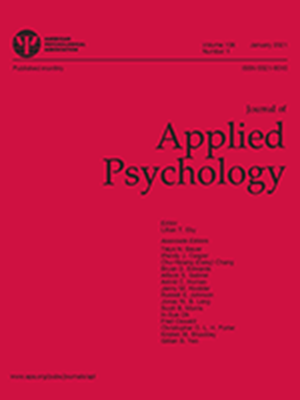Buffered by reflected glory? The effects of star connections on career outcomes.
IF 6.1
1区 心理学
Q1 MANAGEMENT
引用次数: 0
Abstract
Connections to exceptionally high-performing industry stars facilitate individuals' job attainment. But what are the career consequences for people who benefit initially from star connections? Using balance theory, we integrate social network and basking-in-reflected glory research to examine how high expectations resulting from the persistence of reflected glory affect the evaluation of star-connected employees' performance long after their work associations with stars have ceased. To preserve cognitive balance, evaluators may discount the poor performances of the star-connected. Good performances, on the other hand, affirm positive cognitive associations in the minds of evaluators between stars and those who once worked with them. Using the career trajectories of assistant and head coaches in the National Basketball Association (NBA) from 1976 to 2015, we found that star-connected head coaches, relative to their nonconnected peers, were protected from being fired when underperforming but benefited less when overperforming. Study 2 showed experimentally that a star-connected employee, relative to a nonconnected peer, was buffered from the effects of work performance because of the high work performance expectations held by evaluators. We contribute new evidence concerning the effects of star performers on colleagues and move research beyond the fleeting impressions that have occupied prior basking-in-reflected glory work. Further, we contribute to integrating the social network emphasis on advantageous network connections with research on merit-based advancement. The overall conclusion from these two studies is that the reflected glory of star connections influences careers long beyond the hiring stage in ways that buffer individuals from their own performance outcomes. (PsycInfo Database Record (c) 2025 APA, all rights reserved).被反射的荣耀所缓冲?明星关系对职业结果的影响。
与表现异常出色的行业明星的联系有助于个人获得工作。但是,对于那些最初从明星关系中受益的人来说,职业生涯的后果是什么呢?运用平衡理论,我们将社会网络和沉浸在“反射荣耀”的研究结合起来,研究了在与明星的工作联系结束后,持续的“反射荣耀”所产生的高期望如何影响对“明星关系员工”的绩效评估。为了保持认知平衡,评估者可能会忽略明星出身人士的糟糕表现。另一方面,好的表演肯定了评价者心目中明星和曾经与他们共事过的人之间的积极认知联系。利用1976年至2015年NBA助理教练和主教练的职业轨迹,我们发现,与没有明星关系的同行相比,有明星关系的主教练在表现不佳时不会被解雇,但在表现出色时受益较少。研究2通过实验表明,与没有明星关系的同事相比,有明星关系的员工受到工作绩效影响的缓冲,因为评估者对工作绩效抱有较高的期望。我们提供了关于明星员工对同事的影响的新证据,并使研究超越了先前沉浸在荣耀中的短暂印象。此外,我们将社会网络对优势网络连接的强调与基于绩效的晋升研究相结合。这两项研究的总体结论是,明星关系所反映的荣耀对职业生涯的影响远远超出了招聘阶段,它可以缓冲个人自身的绩效结果。(PsycInfo Database Record (c) 2025 APA,版权所有)。
本文章由计算机程序翻译,如有差异,请以英文原文为准。
求助全文
约1分钟内获得全文
求助全文
来源期刊

Journal of Applied Psychology
Multiple-
CiteScore
17.60
自引率
6.10%
发文量
175
期刊介绍:
The Journal of Applied Psychology® focuses on publishing original investigations that contribute new knowledge and understanding to fields of applied psychology (excluding clinical and applied experimental or human factors, which are better suited for other APA journals). The journal primarily considers empirical and theoretical investigations that enhance understanding of cognitive, motivational, affective, and behavioral psychological phenomena in work and organizational settings. These phenomena can occur at individual, group, organizational, or cultural levels, and in various work settings such as business, education, training, health, service, government, or military institutions. The journal welcomes submissions from both public and private sector organizations, for-profit or nonprofit. It publishes several types of articles, including:
1.Rigorously conducted empirical investigations that expand conceptual understanding (original investigations or meta-analyses).
2.Theory development articles and integrative conceptual reviews that synthesize literature and generate new theories on psychological phenomena to stimulate novel research.
3.Rigorously conducted qualitative research on phenomena that are challenging to capture with quantitative methods or require inductive theory building.
 求助内容:
求助内容: 应助结果提醒方式:
应助结果提醒方式:


